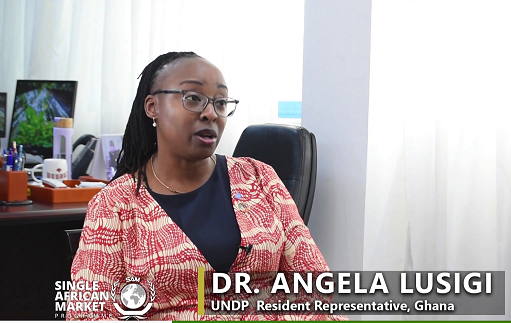The Resident Representative of the United Nations Development Programme (UNDP) in Ghana, Dr. Angela Lusigi, has urged policymakers and state actors, particularly in the trade sector, to empower small and medium-sized enterprises to take advantage of existing digital trade tools and infrastructure to make them ready and competitive to do business under the African Continental Free Trade Area (AfCFTA).
Speaking in an interview with Single African Market on findings of a recently conducted COVID-19 Business Tracker survey that was published by the Ghana Statistical Service, Dr. Lusigi said: “As a development organisation, we always want to ensure that we leave no one behind; and so it was important that we looked across the spectrum to identify how to enable benefits of the AfCFTA to reach everyone”.
She explained that: “Having the right information and making sure that the SMEs are ready to take advantage of these opportunities is something we are very interested in”.
The COVID-19 Business Tracker survey studied about 4,800 businesses that were categorised into sizes with representative samples from across the country, to identify from these businesses the policies which have been introduced to help them recover from shocks of the virus pandemic and what they want to be assisted with going forward.
The study also found out from participating businesses the existing opportunities for the future of their business – of which the AfCFTA featured prominently.
“The AfCFTA is an opportunity to drive Ghana’s structural transformation and create the much-needed jobs for its people, and we wanted to find out from these enterprises whether they knew about the opportunities that its holds for their business,” Dr. Lusigi said.
“We realised that SMEs are the backbone of Ghana’s economy; so when Covid struck, we wanted to find out what was happening to these businesses and the right policies needed to help them recover,” she added.
She further explained that the UNDP and its partners have been tracking the same businesses over time, “because we are interested in finding out how we can build the resilience of these SMEs, which also provide over 70 percent of Ghana’s GDP, and how to resuscitate their growth potentials”.
She suggested that as businesses across all sectors of the Ghanaian economy see the single continental market as an opportunity for sustained growth and recovery from the harmful effects of the pandemic, access to ready information and policies on the AfCFTA will be greatly helpful to Ghana’s participation in the market.
“We also believe there should be an integrated support system for SMEs, and we have a prototype that looks at a range of services and supports these enterprises need – including access to finance and business know-how,” she noted.










